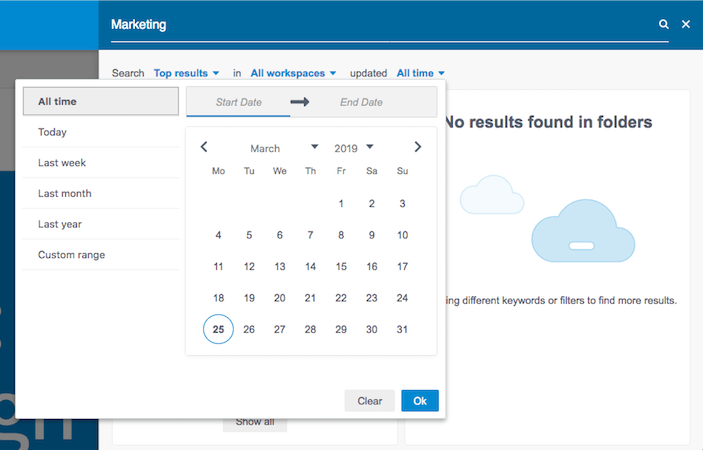How to Use Search: Search Terms, Boolean, Special Characters and Wildcards
You can use the tips below to enhance your searches in Huddle as we support Boolean operators, escaping special characters and the use of wildcards.
 Tip: Get to the content you're looking for faster with basic search functions in the finding content article.
Tip: Get to the content you're looking for faster with basic search functions in the finding content article.
I) Search Terms
1) If you want to search for a single word, type it into the search box
Single Term (single word): hello
2) If you want to look for multiple words in a specific order, you can put quotation marks either side of the phrase you are looking for:
Phrase (group of words): "hello huddle"
2) If you want to search for multiple words that do not appear in a phrase together, enter all the words you would like without quotation marks. Multiple words are treated as AND, so:
Happy Huddler = results with either "Happy" or "Huddler"
whereas
"Happy Huddler" = results with "Happy Huddler" together only
II) Boolean Operators
Huddle search supports Boolean operators OR and AND, you can combine these with the search term logic above.
OR
If you search for "hello" OR "goodbye" search will return results that contain both terms as well as results that contain one term or the other.
AND
If you search for "hello" AND "goodbye" search will only return results that contain both terms together.
NOT
If you run a search for "hello" NOT "hi" your search results will only show content containing the word "hello". It will exclude results containing "hi".
III) Escaping Special Characters
Search supports escaping special characters that are part of the query syntax. This allows you to look for items with one of these characters in the content. The current list of supported special characters is:
+ - & | ! ( ) { } [ ] ^ " ~ * ? : \
To escape these, use the \ before each character. For example to search for (1+1):2 use the query:
\(1\+1\)\:2
In general, it is best to avoid including special characters in search unless they are used in the context of wildcards.
IV) Wildcard
When searching in Huddle, if you are not sure of the exact search term to use, or you are looking for a document that you think exists, but are not sure about, you can use * or ? to fill in the gaps in your search terms.
* matches multiple characters (including spaces).
? matches a single character.
For example:
- Cand* will search for documents containing words that start with Cand, and will match Candy, Candidature, Candid…
- Cand? will search for documents containing words that start with Cand and have exactly one other letter, so it will match Candy, Candi, Cande…
If you want to find a word as well as its plural you can search for dog? which will find dog and dogs.
You can use wildcards inside a word too. For example:
- not*cation will match notification as well as not a vacation because the * symbol includes any number of characters including spaces.
- not???cation will match notification as each ? matches only one character
Please note that searches starting with a wildcard are not supported.
V) Date range
The All time section allows you to further define your search within the following sets range of periods (Today, Last week, Last month, Last year or a Custom range of period.
* Today: Your current working day
* Last week: Previous calendar week starting from Monday - Sunday
* Last month: Previous calendar month
* Last year: Previous calendar year
* Custom range: A date range of your choice




